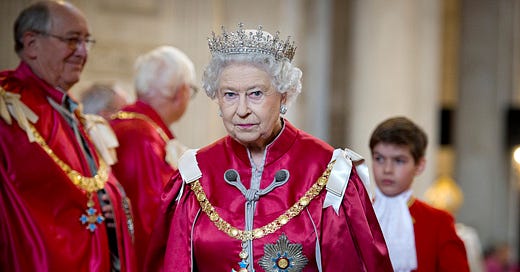It is 5am on a Monday morning in Washington, D.C.
I have no shortage of work that needs to be done. I have emails to send, meetings for which to prep and schedule, calls to make, just a lot of things to do that really cannot be put off. And yet, here I am, at an ungodly hour, watching dignitaries slowly file in for the funeral of a woman I never met and who never did anything for me.
Why?
How does a kid raised in trailer parks in Central Texas come to be obsessed with the British Monarchy and admire Queen Elizabeth II?
Nowadays, TLC is a channel where you’ll find programming as illuminating and varied as “90 Day Fiancé” and “90 Day Fiancé: Pillow Talk” and “90 Day Fiancé: Just Landed” and “90 Day Fiancé: Before the 90 Days” (I’m not kidding; these are all real titles, and I’ve intentionally kept the list short).
But in the early ‘90s, it was literally known as The Learning Channel, and in the only real bonding moments I can remember having with my maternal grandmother, we would sit beside each other in her bed in my grandparents’ trailer and watch episodes of “Great Castles of Europe”, a series that ran for two seasons on the network.
The show would take viewers on tours of these castles and the royalty that lived in them and the culture and social structure of the time in which they lived.
My grandmother would smoke a cig that she had asked me to spark on the kitchen stove and have me grab her a coke and we’d sit there for half an hour marveling at the gorgeous scenery on the tube while she told me the bits and pieces she knew about the British Royals.
I was hooked. I knew what “divine right” meant long before 4th grade social studies, to say nothing of the increasing controversy surrounding Charles & Diana, earning a fluency in House of Windsor scandals, via my grandmother, that would later shock my elementary school teachers.
The typical American view in the ‘90s was this: we didn’t think much of Charles, but we loved both Diana and the Queen—for different reasons.
More on that in a second.
Some of our British friends have openly wondered why Americans are obsessed with the Windsors, especially given our supposed aversion to elitism and complicated class politics and living thousands of miles away and the not-so-small fact that our nation was borne out of rebellion against the British Crown.
Honestly, I wish it were complicated, but it’s not. The simple answer is that it’s free and glorious entertainment. It costs us nothing. Americans don’t have to pay for the show, but we still get to watch it. There’s the soap opera drama, sure, but even were it not for the salaciousness, there’s still the over-the-top pageantry.
We love a big wedding.
Nor has it ever really cost us having an opinion on the existence of the Monarchy. We have never been truly obligated to any degree of partisanship on the question.
Vehemently oppose the Monarchy? Okay. Weirdo American royalist? Okay, too. Who cares — let’s all watch the shenanigans together and comprise a ridiculous peanut gallery from across the pond. Nothing lost and nothing gained.
There’s a sort of unspoken inside joke to observing the Monarchy as an American, something which we historically don’t even acknowledge to each other because, until recently (with the ludicrous, racist treatment of Meghan), there’s been no need. It would be stating the obvious.
That is: does any American really believe the British Monarchy represents the best of humanity, the embodiment of morality? Hell no. It’s a silly question, one so obviously answered that there’s no need to discuss it.
The 19th-century British writer Walter Bagehot is most frequently cited when explaining the justification for the existence of the Crown. Bagehot wrote that Parliament is the “efficient” part of the State and the Crown is the “dignified” part of it.
The Crown is meant to be above the fray, never sullied with day-to-day politics and, instead, serves as the supposed living embodiment of British values. The Crown is meant to provide a steady and unwavering bulwark of morality.
This is, on its face, completely ridiculous. How can the Crown supposedly embody British values without ever speaking to what those values should be or how they should evolve? No one really seems to know, but moreover, that’s not really the point.
It’s silly to defend the British Monarch as a head of state. The Crown has no real legal power on paper. It cannot make new laws. It can’t dictate the Armed Forces. It can’t express partisan opinions. Even the speeches offered by the Monarch to open Parliament aren’t written by the Monarch. It is merely a formal mouthpiece used by the government.
The Crown does not really exist to express defined and irrefutable values. The most dedicated royalist, in good faith, must inevitably concede that the British Sovereign does not really perform as a nuanced arbiter of right and wrong.
And deep down, regardless of nationality, we all kinda know that.
The reality is that the House of Windsor’s primary purpose is being one of the most popular entertainment brands in the world. This is an acting troupe. With few exceptions, every member of the British Royal Family is simply playing a role for the public that is typically at odds with their authentic self.
Ah, but the exceptions. That’s where it gets interesting. To be an exception to this framework is to go one of two directions: either breaking away from the firm completely or having an existence, public and private, that is indistinguishable from it.
Diana broke way. As did Harry and Meghan. And they are beloved for it. They said “to hell with this” and rejected the obligation of playing a role. We love them for their commitment to authenticity in opposition to their institutional obligations.
We love Queen Elizabeth II for a different reason. She was not acting. She truly believed that every fiber of her being must serve in existence as an anchor for the Commonwealth. In the place of evolution, she offered an ironclad resolve to tradition and dignity. The Queen in private was essentially the Queen in public, and we all knew that.
You didn’t have to like the Queen to know that she would have never abandoned the United Kingdom. If that island had been invaded at any point during her reign, she was committed to going down with the ship. And you respected that about her.
Ironically, in a role that is meant to be bereft of opinion, her commitment to outward neutrality made her partisan moments all the more powerful, however subtle or implied — her opposition to Apartheid, her annoyance with Thatcher’s austerity, her tacit support of LGBTQ rights, her less-than-subtle disgust with Trump, her protocol-breaking warmth toward Michelle Obama.
When she came down to London to address the nation and the world in the wake of Diana’s death, that was more than enough to alleviate the outrage at the Crown’s initial response.
When she made her historic trip to the Republic of Ireland in 2011 and demonstrated a substantial degree of humility and respect, literally bowing and speaking in Gaelic, that was more than enough to win over her hosts.
There was a density to her gravitas that made every gesture and word carry enormous impact, far more than any other world leader.
She truly believed in her earthly commission during a reign that increasingly saw global leaders become more cynical and openly performative, and thus, most of us gave her substantial benefit of the doubt.
If there were ever an Era of Earnestness in global politics, that has definitively come to a close with her death. Sobering, to say the least.
During one of our evenings in her bedroom, I remember asking my grandmother why she despised Charles but loved the Queen, and she didn’t say anything for a moment, the smoke billowing from her hand as she briefly appeared lost in thought.
“You never have to guess with her”, she answered a few moments later, her voice raspy. “What you see is what you get.”
And we’ll never have that again.
Hi, I’m Charlotte Clymer, and this is Charlotte’s Web Thoughts, my Substack. It’s completely free to access and read, but if you feel so moved to support my writing, please consider upgrading to a paid subscription: just $7/month or save money with the $70/annual sub. You can also go way above and beyond by becoming a Founding Member at $210.














Share this post